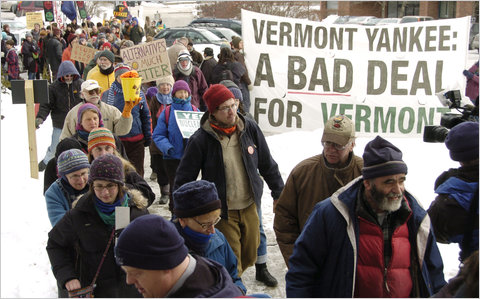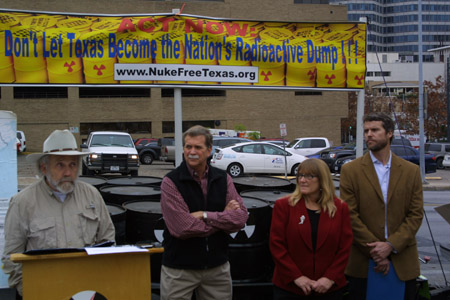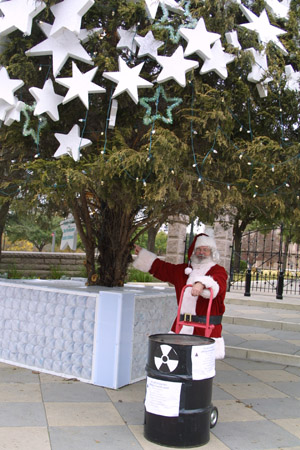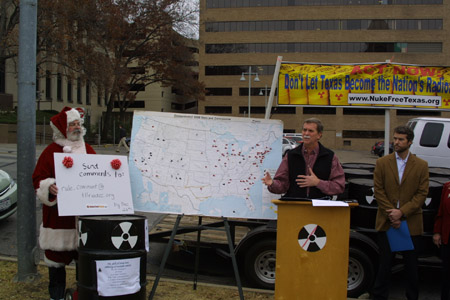Archive for the ‘Toxic Waste Dump’ Category
Texas Welcomes Nuclear Discards
Wednesday, January 5, 2011
By ANA CAMPOY
Wall Street Journal
A Texas commission Tuesday set in motion the importation of low-level radioactive-waste from 36 other states, a move long sought by the nuclear-energy industry and long opposed by environmentalists.
The Texas Low-Level Radioactive Waste Disposal Compact Commission, which manages the state’s radioactive-waste dump, voted 5-2 to approve rules governing the process for accepting the out-of-state material.
The decision drew a quick response from the plan’s opponents, some of whom opposed the idea because the site is near the Ogallala aquifer that provides drinking water to several states.
"We’re going to consult with our lawyers and probably sue them," said Tom "Smitty" Smith, director of the Texas office of Public Citizen, a consumer watchdog group. Mr. Smith, who said the commission violated rules in the public-comment process, was present at the panel’s meeting in Andrews County, in remote west Texas, where the storage site is located.
The plan enjoyed he backing of the nuclear industry, which is now limited to three other such storage sites in the U.S. "It’s a positive step forward," Steve Kerekes, spokesman for the Nuclear Energy Institute, an industry trade group, said of the commission’s vote.
Controversy had surrounded the proposal in part because the dump, set to open by year’s end, was conceived and built to take waste from only two states—Texas and Vermont.
Even with the commission’s decision, the fight over the plan was likely to endure through court appeals.
The site will permanently store low-level radioactive waste—contaminated materials and equipment from nuclear plants, research laboratories and hospitals. The material includes everything from parts from dismantled nuclear-energy plants to booties worn by scientists working in labs where radioactive materials are present. More highly contaminated waste, such as spent fuel from power plants, wouldn’t be stored at the site.
The waste will be stored at the 1,338-acre site in concrete-reinforced underground units.
States are responsible for handling low-level radioactive waste produced within their own borders, but space for it is limited. And the three disposal sites for it in the U.S. don’t take all kinds of materials within the low-level category or can only take waste from certain states. That leaves 36 states without a permanent storage place.
The commission’s decision wasn’t a surprise.
"This is a major milestone," said Ralph Andersen, an official at the Nuclear Energy Institute, an industry trade group, before the vote. "It’s going to provide much needed space."
But some environmental groups said the plan would provide an incentive to the nuclear-energy industry to expand without coming up with better places to store its refuse.
"It’s defying logic to make more waste that we don’t have a good place to put," said Diane D’Arrigo, an expert with the Nuclear Information and Resource Service, a nonprofit group based in Takoma Park, Md. that advocates against new nuclear plants.
In Texas, activists also said that the state would be stuck with liabilities if the site leaks.
The controversy was tinged with Texas politics. Opponents say a conflict of interest exists between the commission, most of whose members were appointed by Texas Gov. Rick Perry, and the site’s owner, Waste Control Specialists LLC, whose main investor, Harold Simmons, is a donor to Mr. Perry.
Lucy Nashed, a spokeswoman for Mr. Perry, said his appointments are "based on an individual’s qualifications and willingness to serve" and that he expects their decisions to be in the best interest of Texas.
Waste Control spokesman Chuck McDonald said that Texas regulators already deemed the site safe, and thus granted a license for the project. The state will receive a cut of disposal fees as well as a $136 million fund to help pay for any future liabilities, he added.
Before the commission’s vote, Mr. McDonald said it had nothing to do with Mr. Simmons’s donations, which are made to Republicans all over the country. Rather, he said, it was about ensuring that economics for the project were solid.
"If the compact site is not economically viable there’s no place for that waste to go," he said.
Before voting on the rules Tuesday, the commission had addressed one concern Tuesday afternoon—from Vermont’s Democratic Gov.-Elect Peter Shumlin. Mr. Shumlin, who is scheduled to assume office on Thursday, had opposed importing radioactive trash from other states for fear that it would fill up the dump. On Tuesday, the commissioners agreed to reserve 20% of the space for his state.
Write to Ana Campoy at ana.campoy(at)dowjones.com
This document contains copyrighted material whose use has not been specifically authorized by the copyright owner. SEED Coalition is making this article available in our efforts to advance understanding of ecological sustainability, human rights, economic democracy and social justice issues. We believe that this constitutes a "fair use" of the copyrighted material as provided for in section 107 of the US Copyright Law. If you wish to use this copyrighted material for purposes of your own that go beyond "fair use", you must obtain permission from the copyright owner.
Douglas Officials Will Vote To Expand Nuclear Waste Dump
Monday, 12/27/10 5:50pm and Tuesday, 12/28/10
John Dillon
VPR News
Listen to podcast at VPR News (2:30)
(Host) Officials with the outgoing Douglas administration will vote in favor next week of expanding a nuclear waste dump that Vermont shares with Texas.
That’s even though Governor-elect Peter Shumlin asked that the vote be delayed so his staff could have time to evaluate the plan.
VPR’s John Dillon has more:
(Dillon) Vermont and Texas now share exclusive rights to a low level radioactive waste site to be built in west Texas.
But the eight-member commission that oversees the project will vote next week on a proposal to open up the site to 36 other states.
It’s a controversial plan. Texas environmentalists are fighting the expansion. And Governor-elect Peter Shumlin says he’s worried that Vermont could get squeezed out if other states are allowed in. So he’s asked for a brief time out.
(Shumlin) "I would urge our two commissioners to not get on the plane to Texas to give my administration the time to really evaluate the deal and make sure it’s as good as it can be."
(Dillon) Public Service Commissioner David O’Brien is Governor Jim Douglas’s point person on utility issues. O’Brien says the Vermont members of the commission will fly to Texas for the vote next week.
(O’Brien) "I think this is what we believe is in the best interest of the state. I think there will be ample opportunity for the new administration to have an imprint on this. I sure hope that they look at this very closely before they unwind anything we’ve done."
(Dillon) The Vermont members of the commission were named by the Douglas administration, and they were the swing votes in favor of the expansion proposal. As governor, Shumlin could replace them with new members, who could block the dump expansion.
O’Brien says he and his staff have worked on the radioactive waste issue for years.
(O’Brien) "I think that for some people that maybe this is a new issue, but this is an effort that’s been going on for, gosh, the better part of all the eight years that I’ve been commissioner."
(Dillon) But Shumlin is not the only one calling for a second look at the expansion. Bob Gregory is a commissioner from Austin, Texas. He opposes the expansion plans and says the process should be slowed down.
Gregory says Vermont risks losing access to the dump if the facility is allowed to accept waste from three dozen other states.
(Gregory) "I think the license facility or the license capacity can be consumed before Vermont gets to the point that it needs it for the disposal of the waste from Vermont Yankee’s plant."
(Dillon) But David O’Brien – who will leave his post in early January – says Vermont’s interests are protected.
For VPR News, I’m John Dillon in Montpelier.
This document contains copyrighted material whose use has not been specifically authorized by the copyright owner. SEED Coalition is making this article available in our efforts to advance understanding of ecological sustainability, human rights, economic democracy and social justice issues. We believe that this constitutes a "fair use" of the copyrighted material as provided for in section 107 of the US Copyright Law. If you wish to use this copyrighted material for purposes of your own that go beyond "fair use", you must obtain permission from the copyright owner.
Judge halts radioactive dump plan for now
Dec. 30, 2010
By JAY ROOT
ASSOCIATED PRESS/Houston Chronicle
AUSTIN — A Texas judge ordered a temporary halt Thursday to a proposal that could allow three dozen states to dump their radioactive waste in far West Texas, a ruling that sided with environmentalists and caught the state attorney general’s office off guard.
State District Judge Jon Wisser issued a temporary restraining order against the Texas Low-Level Radioactive Waste Disposal Compact Commission, which is scheduled to vote Jan. 4 on rules that could expand how much waste could be processed at a dump in remote Andrews County.
The injunction was issued in the judge’s courtroom late Thursday morning, shortly after environmentalists filed the request, with nobody there representing the commission. A few minutes later, shocked lawyers from the Texas Attorney General’s Office – which hadn’t been officially notified of the pending court action – showed up and persuaded the judge to order a new hearing on the injunction.
The hearing is set for Monday in Austin, one day before the commission’s scheduled vote.
Environmentalists sought the ruling after accusing regulators and a politically connected company of rushing the waste expansion proposal past Texas residents who were too focused on the holidays to notice.
Waste Control Specialists, whose majority owner is Dallas billionaire and prolific political donor Harold Simmons, wants state regulators to approve its proposal to allow low-level radioactive waste at its West Texas dump site from three dozen states. As it stands, the compact site can only get waste from Texas, Vermont and the federal government.
The timing of the commission’s vote next week has its own political intrigue.
The commission has six members from Texas and two from Vermont. The incoming governor of Vermont, Democrat Peter Shumlin, has publicly criticized the proposal, but he doesn’t take office until Jan. 6. By then, the two commissioners appointed by his predecessor could vote in favor of the plan, given their past support of the rule.
In their court filings Thursday, environmentalists said many Texans wanting to comment on the proposal were blocked from doing so because the commission used a defective e-mail address and then ended its 30-day public comment period on the day after Christmas, when federal post offices were closed.
Charles Herring, an attorney for environmental group Public Citizen, said the commission violated several procedures and was trying to quickly adopt new rules in order to reward billionaire Simmons.
"They shouldn’t be able to violate seven laws just to pay a political favor to somebody, with the result being we’re going to degrade the environment and threaten the folks with radioactive waste," Herring said.
Chuck McDonald, a spokesman for Waste Control Specialist, described Thursday’s court action as a legal stunt designed to delay the vote past the swearing-in of the Vermont governor.
"It is disappointing that after two years of public input and hours of public testimony, we’ve come to this last-ditch attempt to derail what has been a very thorough and open process," McDonald said. "I think they’re merely trying to buy a couple days’ delay."
The environmentalists sued the commission Thursday to halt the vote, and acknowledged that they didn’t tell the attorney general’s office. They said the bi-state commission is not set up as a traditional Texas agency and does not get legal representation from the state.
This document contains copyrighted material whose use has not been specifically authorized by the copyright owner. SEED Coalition is making this article available in our efforts to advance understanding of ecological sustainability, human rights, economic democracy and social justice issues. We believe that this constitutes a "fair use" of the copyrighted material as provided for in section 107 of the US Copyright Law. If you wish to use this copyrighted material for purposes of your own that go beyond "fair use", you must obtain permission from the copyright owner.
A Last-Minute Choice by Texas and Vermont
December 30, 2010
By MATTHEW L. WALD
New York Times

Demonstrators marched in Montpelier last January in support of retiring the Vermont Yankee nuclear power plant. Tearing down the reactor will generate substantial waste.Associated Press Demonstrators marched in Montpelier last January in support of retiring the Vermont Yankee nuclear power plant. Tearing down the reactor will generate substantial waste.
Vermont and Texas, the odd couple of nuclear waste disposal, are proceeding with a plan to allow 36 other states to use a dump site under development in west Texas, despite the misgivings of Vermont’s incoming governor, Peter Shumlin, about the move.
The issue confronts the two states because 16 years ago they formed a "compact" to establish a repository for low-level radioactive waste.
Under federal law, states in a compact can limit a dump site to their own use. But with a dump now being developed in Andrews, Tex., near the New Mexico state line, a commission made up of representatives of the two states has proposed letting in waste from other states.
A public comment period ended on Dec. 26. The commission has scheduled a vote for Jan. 4, two days before Mr. Shumlin is scheduled to take office in Montpelier.
Mr. Shumlin opposes the policy; he has expressed worry that if waste from other states is allowed in, there might not be enough space left for Vermont, especially since he is calling for the shutdown of Vermont’s only nuclear reactor, Vermont Yankee. Tearing it down will generate substantial nuclear waste that will require burial somewhere.
Opponents of the plan say that 5,000 comments have been filed, most of which presumably oppose the move. Proponents argue that the volume of waste produced by Vermont and Texas is so small that costs per cubic foot of waste will be too high. They can lower the cost, they say, by inviting other waste generators, mostly power plants but also hospitals and laboratories, to bury wastes there. Outsiders would pay higher rates.
The proponents add that there is plenty of space for all of Vermont’s waste, even rubble from the reactor.
In Montpelier, David O’Brien, the public service commissioner, who will leave office as Mr. Shumlin is sworn in, said in a telephone interview: "We’re going to take the vote we’re going to take. It’s a logical progression of what we’ve been doing, and we’re not going to reverse field here."
But, he said, if Mr. Shumlin appointed new members to the commission, they could probably reverse the policy later, since many subsequent votes would be needed.
Elizabeth H. Miller, who has been designated by Mr. Shumlin to succeed Mr. O’Brien at the Public Service Commission, said that the governor elect had asked that Vermont’s two delegates on the interstate compact commission sit out the Jan. 4 meeting, but that they would not do so. She agreed with Mr. O’Brien, though, that there would be votes in the future before waste could be imported.
"The incoming administration is going to be very active" on the issue, Ms. Miller said.
Nuclear Waste From as Many as 36 States May Rumble Down Texas Highways if Texas Nuclear Waste Importation Plan Is Approved
Texans Have Until Sunday to Speak Against Radioactive Waste Rolling Along Highways and Rails
For Immediate Release:
Dec. 23, 2010
Contact:
Tom "Smitty" Smith (512) 477-1155
Trevor Lovell (512) 470-6572
Karen Hadden 512-797-8451
Download this release in pdf format for printing.

AUSTIN – Standing in front of a trailer full of black waste barrels representing radioactive waste, Public Citizen and the Sustainable Energy and Economic Development (SEED) Coalition today detailed a slew of problems associated with a plan to ship radioactive waste from 36 states into Texas.
"Texas radioactive waste commissioners are considering new rules that could allow Texas to become the nation’s radioactive waste dumping ground. The volume of waste transported, imported and stored could go up as much as 19 times," said Tom "Smitty" Smith, director of Public Citizen’s Texas office. "Our state law was designed to protect us from taking waste from many states. However, if these rules are changed, generators from all over the country can petition to send their waste to Texas if the commissioners approve the importation. Texans could get stuck paying billions to clean up the mess left behind."
The event was designed to raise awareness about the dangers of hauling so much radioactive waste through Texas towns by truck and rail. While routes are not yet designated, potential routes would take waste from the Gulf Coast area on Interstate 10 through Houston and San Antonio; waste from southern states would be trucked on I-20 and I-30 though Dallas and Forth Worth; Midwestern and Northeastern waste would be driven on I-40 and I-27 though Lubbock and Amarillo; and waste from Western states would be driven though the cities of El Paso and Odessa taking I-10 and I-20, according to Martin Resnikoff of Radioactive Waste Management Associates.
On Aug. 24, 2001, it was revealed that a 22-ton shipment of waste from an Illinois gaseous diffusion plant headed for Andrews, Texas, was lost for nearly a month. It was later found dumped on a North Texas cattle ranch near Oklahoma, piled on plastic and covered with dirt.
"Truck crashes occur all the time on our highways," Smith said. "This plan would dramatically increase the amount of radioactive waste traveling through our communities. We believe that if people know what is at stake, they will contact state officials and demand that the compact commission drop the proposal."

Nuclear Regulatory Commission (NRC) rules provide that class "A" wastes can be shipped in so-called "strong tight containers," barrels that do not have to pass any integrity test. About 10 percent of these containers that have been involved in accidents have failed. Of those, about 90 percent have released their contents, according to the NRC.
Under a 2003 agreement, a dump in Andrews County was designated to take radioactive waste from just Texas and Vermont. Now, the Texas Low Level Radioactive Waste Disposal Compact Commission is proposing to allow the importation of low-level radioactive waste from 36 states that don’t have anywhere to ship it.
The proposed dump would be operated by Waste Control Specialists (WCS), which is owned by Simmons, a politically powerful Republican who helped bankroll the Swift Boat attacks on Sen. John Kerry and who, according to Texans for Public Justice, has given Texas Gov. Rick Perry $1.12 million over the past decade, including $500,000 in 2010, making Simmons the No. 2 all-time individual donor to the governor.
The commission proposed rules earlier this year for such an expansion but withdrew them after receiving more than 3,000 comments from the public, most of them adamantly opposed to importation. On Nov. 3, the morning after the elections, the commission announced the rules would be re-posted with only minor changes. Citizens have until Sunday to submit comments.
"This looks like a Christmas present for a major donor," said Karen Hadden, director of the SEED Coalition. "Would Waste Control Specialists be able to expand so greatly if its owner wasn’t so politically connected? We suspect not."
"This is a blatant attempt to get these rules through while the public is busy with the holidays," Hadden added. "The commission should postpone these rules until both the Texas and Vermont legislatures – and the incoming Vermont governor – can consider the matter. Building a national nuclear waste dump in Texas violates the intent of the original Texas-Vermont agreement, which would limit the waste and raises a host of serious safety concerns that lawmakers need to consider."

A primary concern for the Texas Legislature would be the state’s liability for the waste. Under state law, once the waste is accepted for disposal, the taxpayers – not WCS – are liable for any spills, seepage into the groundwater or other contamination. This could easily result in millions or even billions of dollars in liability for Texans – far more than the $136 million dollar bond posted by WCS for such problems. For example, the Western New York Nuclear Service Center in West Valley, N.Y., could cost $9.9 billion or more to clean up, according to an analysis by Synapse Energy.
The staff who reviewed the permit at the Texas Commission on Environmental Quality (TCEQ) unanimously recommended against granting a license for a low-level radioactive waste dump. In an interoffice memo, TCEQ technical staff said that it was "highly likely" that radioactive waste would leak into groundwater. Several quit in protest when their recommendations went unheeded by then-Executive Director Glenn Shankle and the facility was licensed anyway. Shankle went on to work for Simmons as a lobbyist, representing WCS just six months after leaving the TCEQ.
Risks of groundwater contamination are a significant concern. Maps have been in flux while a hot debate centers on whether the WCS site is connected to the Ogallala, a huge aquifer that provides drinking water for nearly two million people and extends beneath eight states, also supplying water for more than a quarter of the country’s irrigated land.
"People have to understand that this is their last shot to block a national radioactive waste dump from being built in Texas, with all the dangers that come with that," Smith said. "We urge Texans to send comments and ask the commission to push the pause button on this proposal until such time as the legislature has a chance to look at the risks from an accident or from a leak. This proposal is being railroaded through the process before the fiscally conservative Texas Legislature recognizes what a giveaway this is."
Instructions and suggestions for comments are available at http://www.TexasNuclearSafety.org .
All photos courtesy of Andy Wilson.
###
Public Citizen is a national, nonprofit consumer advocacy organization based in Washington, D.C., with an office in Austin, Texas.
The Sustainable Energy and Economic Development Coalition is working for Clean Air and Clean Energy in Texas


